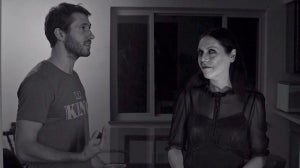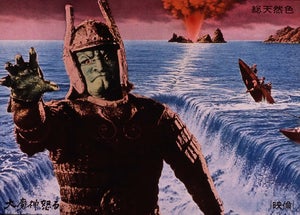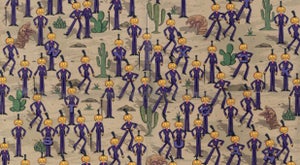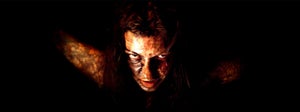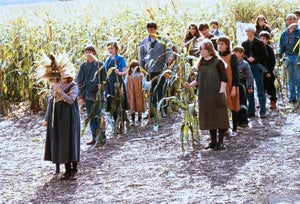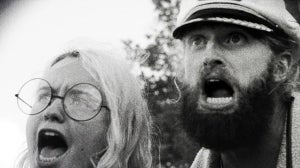
A tyre with an unstoppable quench to kill, a man on a mission to become the only person in the world to wear a jacket, a film producer on a frenzied quest to find the best groan of pain ever heard by man, an unusual group of superheroes led by a sexually hyperactive rat… There are no limits to the creative chaos that lies within the mind of French director Quentin Dupieux.
It was at age 19 that Dupieux bought his first synthesiser, kickstarting a passion that would lead him to a career in electronic music under the stage name Mr Oizo (derived from the French word for bird, oiseau). His interest in music was born intrinsically connected to a penchant for imagery — his creative first steps involved juxtaposing his own photographs to embryonic experimentations with the synth. Being Dupieux, of course, success first hit with the aid of an odd-looking bright yellow puppet: Flat Eric.
An earless dog-like puppet, Flat Eric was christened out of Dupieux’s desire to have a car run over his head, thus flattening it. The filmmaker never got to realise such ambitions within the strained world of advertisement, but he did manage to place — and direct —- Flat Eric in a series of Levi’s commercials that rose to rapid popularity in France.
Rather than retiring the puppet after its initial publicity stunt, Mr Oizo made him a permanent-ish fixture in his music videos, with the yellow rugged dog attaining notoriety after starring in the video for Oizo’s Flat Beat, a song that became a European sensation, landing number one in a series of countries including the United Kingdom and catapulting Flat Eric to pop culture stardom, including appearances in morning TV shows and BBC hit comedy The Office.
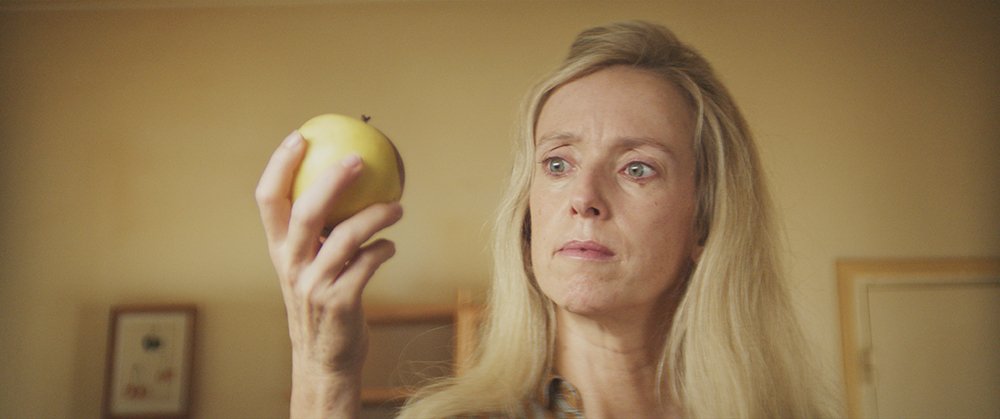
It was clear from the get-go that Dupieux had little interest in the conventional, a notion reinforced by his first two films, Nonfilm (2002) and Steak (2007). While the former signalled his hankering for the meta by placing a film within a film as actors try to unravel the sinister reality they’re trapped in, the latter marked the director’s first proper dive into the world of absurdism. Steak approached the knotty aftermath of Columbine via a friendship break-up told through a potpourri of gang politics, an addiction to facial reconstructive surgeries and a wacky version of cricket. Despite Cahier du Cinema famously labelling Dupieux’s sophomore feature “crazy with purpose” and claiming the film “leaves us slack-jawed and wide-eyed”, its success failed to travel overseas… Unlike its director.
The early 2010s marked Dupieux’s American period. In the US, he made Rubber (2010), Wrong (2012), Wrong Cops (2013) and Reality (2014), a quadrilogy concerned with investigating the Americana through the eyes of a Frenchman who pieced together a vision of the country through its cinematic mythology. Within his American films, Dupieux revisits his explorations of the meta to play with the role of an audience, seesawing the spectator’s gaze from the allegorical to the overexposed and back to the allegorical.
His work unravels as a narrative Frankenstein, chopping the limbs of classic American cinema and ricketily stitching it to the often fragile bones of satire. It functions as a clever vehicle for projection: whatever one wants to get out of it, there is a way of doing so, be it a brainless yet thrillingly entertaining blast of hyperbolic madness or a layered metaphor on the ripples of mindless brutality and unregulated power structures (“Everyone sees a different film, I have no problem with this”, the director said about Rubber while participating in Reddit’s Ask Me Anything series).
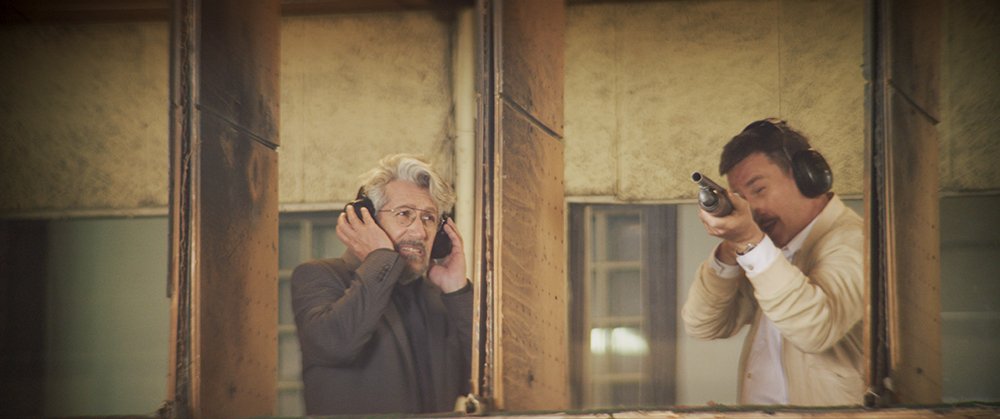
Dupieux returned to his home country of France in 2018, where he has rapidly become one of the most prolific directors of late and a recurrent fixture in European film festivals such as Cannes and the Berlinale. In the four years since his homecoming, Dupieux has made Keep an Eye Out (2018), Deerskin (2019), Mandibles (2020) and two films in 2022, Incredible But True and Smoke Causes Coughing.
The comfort of creating art within one’s own culture and mother tongue coupled with the director’s somewhat mature settling into his own strain of absurdist comedy proved a bountiful match. Working with established names such as Jean Dujardin, Adéle Haenel, and Alain Chabat, Dupieux has, somehow, managed to both refine his craft and acquire a handy disregard for the overbearingly time-consuming process of making films, developing a method that allows him to churn out movies almost as rapidly as it once took him to write a song. On top of directing, the Frenchman writes and edits his own work, which is often based on ideas that come to him in dreams.
There is a counterintuitive sense of safety in Dupieux’s filmography. Consistently forecasting the bonkerest possible scenario allows for a cathartic burst of release, with some contentment to be found in the conviction that there is no semblance of normality looming on the horizon. It is rewarding, too, to enter a film without the burden of having to take from it something bigger than what is being presented.
Part of what makes Dupieux’s persona so ever-alluring is his lack of expectations from the audience, topped with his unwillingness to patronise the viewer by handing neatly packaged explanations for his inscrutable premises. The director rarely engages in convoluted interpretations of his films because, to him, the final product of his creative purging is precisely what it is and the onus of projection weighs on anyone’s shoulders but his. It is a simple transaction, give or take.
“The motivation is always the same. I’m just trying to escape the boring... I'm a dreamer”, said the director when asked about what drives his filmmaking. And if there is one certainty to be had when it comes to Dupieux’s body of work is that, whatever he offers, it certainly won’t be boring.
https://www.youtube.com/watch?v=X4R78LAd8Iw

